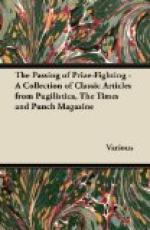“Doesn’t all international law consist in keeping an everlasting bright look-out on your own side, and jamming all other varments slick through a stone wall, as the waggon-wheel used up the lame frog? (Hear, hear.) I say—and mind you I’ll stick to it like a starved sloth to the back of a fat babby—I say, gentlemen, this country, the United States (particularly Kentucky, from which I come, and which will whip all the rest with out-straws and rotten bull-rushes agin pike, bagnet, mortars, and all their almighty fine artillery), I say, then, this country is considerable like a genuine fac-simile of the waggon-wheel, and the pretty oneasy busted-up old worn-out island of the bull-headed Britishers, ain’t nothing more than the tee-totally used-up frog. (Hear, hear.)
“I expect they’d have just as much chance with us as a muzzled monkey with a hiccory-nut. Talk of their fleet! I’ll bet six live niggers to a dead ’coon, our genuine Yankee clippers will whip them into as bad a fix as a flying-fish with a gull at his head and a shark at his tail. They’re jist about as much out of their reckoning as the pig that took to swimming for his health and cut his throat trying it on.
“It’s everlasting strange to me if, to all future posterity coming after us, the word ‘Macleod’ don’t shut up their jaws from bragging of British valour just about as tight as the death-squeeze of a boa-constrictor round a smashed-up buffalo!
“If it wa’n’t for the distance and leaving my plantation, I’d go over with any on you, and help to use up the lot myself! Let them ‘come on,’ as the tiger said to the young kid, and see what ‘I’ll do for you.’ They talk of sending out their chaps here, do they; let them; they’ll be just about as happy as a toad in hot tar, and that’s a fact.” Here Jonathan J. Twang sat down amid immense cheers; at the conclusion of which, Mr. Peter P. Pellican, from the back-woods, requested—he, Peter




